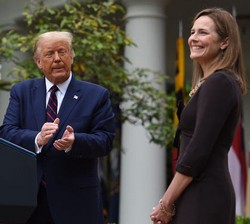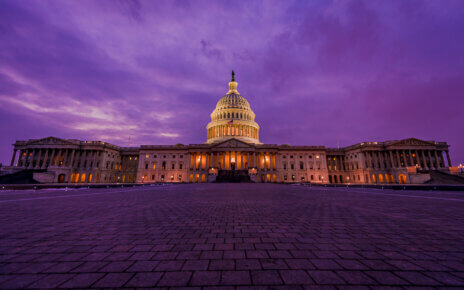Judge of the 7th U.S. Circuit Court of Appeals, Amy Coney Barrett, was nominated by President Trump for Associate Justice of the Supreme Court on Saturday, Sept. 26.
Barrett graduated from Rhodes College and Notre Dame Law School. She taught at Notre Dame for 15 years and continues to teach part time. She is a conservative, Pro-Life judge, who Trump nominated to the 7th Circuit Appellate Court three years ago.
Randall S. Abate, Professor of Political Science and Sociology, explained how our political process works. He explained that Republican presidents nominate conservative justices and Democratic presidents nominate liberal justices.
“Elections matter. Trump’s appointees to the Supreme Court will have a profound influence on the interpretation of our Constitution for the next 30-40 years. It also was important to conservatives and liberals alike to replace Justice Ginsburg with a woman to maintain gender balance on the Court,” said Abate.
Jennifer McGovern, Ph.D., an Assistant Professor of Sociology, also weighed in on the vacancy and politicization of the ostensibly bipartisan process of selecting a Justice.
“Given the way that the Supreme Court vacancy has turned into a political battle,” she said, “I hope that Ginsburg’s passing inspires politicians to work towards finding a solution that has clear rules for nominating justices with respect to election timelines. I hope they can work together to develop a bipartisan solution that can be in place from this point forward.”
McGovern believes that the American people should play a role in the making of this decision. “Democrats in the House are considering a bill on term limits,” she explained. “This is one solution, but I’d like to see a number of solutions proposed that might reduce partisanship and make American people feel like they have a voice in the process.”
Abate then gave his opinion on having a nomination for a new high court justice right before an election. “I understand that the political party in control would seek to capitalize on that opportunity. I am concerned, however, that this very important confirmation process for the highest court in our nation is being rushed and conducted carelessly,” he said. “That concern would have been true even at the beginning of 2020, but it is a much greater concern just one month prior to the election.”
Abate explained how Barrett’s politics are very different from his, but there are many conservative jurists who he trusts to make decisions based on the merits of the disputes before them.
“My concern about Barrett’s track record and candidacy is that she appears to be a ‘hired gun’ to cast the deciding vote to overturn a woman’s constitutional right to choose as established in Roe v. Wade when the opportunity presents itself,” said Abate. “Some are also concerned that the rush to get her nomination confirmed is to provide added support on the Court for Trump in the event that the 2020 election results are contested,”
Matt Filosa, junior political science student, explained that the nomination of Barret to the Supreme Court is being ridiculed to the Supreme Court for two reasons. “First, it comes in the midst of an election season, where in 2016 a precedent was created by the Republican senate to hold off on nominations until after the election is held,” he said.”
He elaborated that in 2016, Republicans held off on Obama’s selection, Merrick Garland, to the court. Because of Trump being in office, Republicans feel that she should be nominated to the court as soon as possible, according to Filosa. He also said that there is backlash on social media over this because it is a double standard.
“The second reason could be the issues at stake, her seat on the court will solidify a 6-3 conservative majority. Some people have raised concerns about things like Roe vs. Wade or the Affordable Care Act,” he said.
Filosa then gave his partisan perspective on Barrett’s nomination by saying it was very smart of Trump to nominate her and have her confirmed as soon as possible. The conservative base could solidify a judge for decades who can rule on issues that they advocate for.
“If she is confirmed by the Senate, she could sit on the Supreme Court for decades. This means that she is someone who will have significant influence on cases to come which is something that we all should care about. And that is up to people themselves to decide if they feel this is a person that should sit on our country’s highest court,” said Filosa.
IMAGE TAKEN from USA Today



